The Dodgers placed Ronald Belisario on the restricted list due to “personal reasons,” according to a press note from the Dodgers. Carlos Monasterios has been activated from the 15-day disabled list to take Belisario’s roster spot. Awaiting more details …
Category: Transactions (Page 35 of 36)
No details yet, but the Dodgers announced in a 7:30 a.m. e-mail that Rafael Furcal had been placed on Major League Baseball’s bereveament list. Chin-Lung Hu has been called up to take his roster spot, though he will not arrive in Cincinnati in time for the start of today’s early game.
Placement on the bereavement list means that Furcal will miss from three to seven games.
All my sincerest condolences to Furcal.
Update: Furcal went to the Dominican Republic to see an ailing family member, reports Tony Jackson of ESPNLosAngeles.com.
* * *
- Nick Green opted out of his minor-league contract and became a free agent, reports Christopher Jackson of Albuquerque Baseball Examiner.
- Claudio Vargas returned to the Dodger organization, signing a minor-league contract with the Isotopes, whose pitching has been trashed by injuries, absences, promotions and demotions.
- Russ Mitchell homered twice and singled for Albuquerque on Wednesday, while Michael Restovich doubled, tripled and homered, and Xavier Paul and Ivan De Jesus, Jr. also each had three hits.
- Kyle Russell hit his first AA home run for Chattanooga, while Trayvon Robinson had three hits.
- Fred Claire has a nice story at MLB.com about Monte Irvin, who at age 91 will have his number retired by the Giants. Among other tidbits was this revelation:
… Irvin revealed that when he got out of the service in 1945 he signed a contract with the Dodgers.
“I had been selected by Branch Rickey to break the color barrier,” said Irvin. “I had the talent and I was easy to get along with.”
Irvin said that even though he had signed the contract with the Dodgers, he asked to return to play in the Negro Leagues “because I didn’t want to go to the Major Leagues until I had my game back after three years in the service.”
Irvin said a dispute developed over the contract between his Negro League team and the Dodgers, and he didn’t get his opportunity in the Major Leagues until a deal was worked out with the Giants in 1949.
“Things have a way of working out and I’m just happy that I had the chance to play the game that I loved,” he said.
- Matt Kemp’s struggles get an analysis from Chad Moriyama of Memories of Kevin Malone.
- Second-round draft choice Ralston Cash is close to signing with the Dodgers, reports Bill Murphy of the Gainesville Times.
- Ernest Reyes of Blue Heaven passes along a neat find: a 1955 Brooklyn Dodgers ticket order form. Get your box seats for $3 …
- Here’s a fun historical site: CalTrafficSigns.com (via Franklin Avenue).
Travis Schlichting, the hero of the 14-inning 1-0 victory over Arizona on June 2, was called up to take Chad Billingsley’s spot on the Dodger roster, the team announced today.
In the two weeks since throwing four shutout innings that day, Schlichting has made three appearances for AAA Albuquerque, totaling 4 1/3 innings. He has allowed three runs on seven hits and two walks, striking out two.
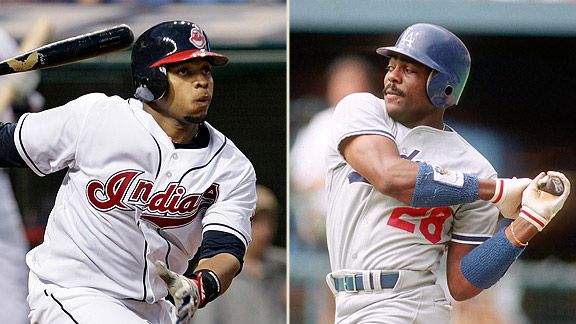
Getty Images/AP
The agony and the ecstasy …
Bruce Ellingsen, Carlos Santana and Jonathan Meloan for Pedro Guerrero and Casey Blake.
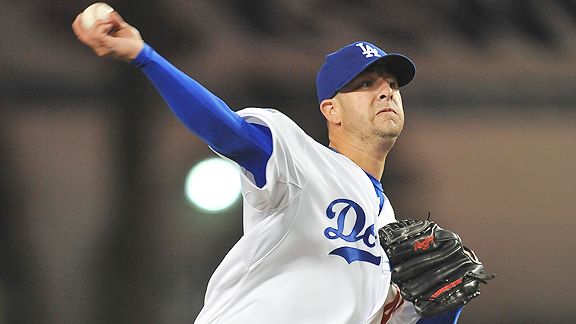
Jayne Oncea/Icon SMI
Justin Miller is on the Dodger roster bubble despite a 3.48 ERA.
Vicente Padilla isn’t a 100 percent lock to rejoin the Dodger starting rotation this weekend, but you can pretty much count on it. Though he gave up four earned runs in 5 2/3 innings for Albuquerque on Sunday, he threw 81 pitches and didn’t walk a batter. Assuming he feels fine physically today, he should be on the Fenway Park mound Friday or Saturday, with John Ely starting the other day and Hiroki Kuroda going on Sunday. (It would make more sense to have Padilla wait until Saturday, thereby giving the Dodgers an extra day with an extra relief pitcher, unless that upset Padilla’s rhythm somehow.)
Padilla’s return means someone on the Dodger pitching staff must get displaced. Justin Miller presents yet another case of a pitcher whom the Dodgers would like to retain but is out of options. Miller, who gave up what turned out to be a critical eighth-inning home run Sunday, hasn’t pitched badly for the Dodgers, allowing 13 baserunners in 10 1/3 innings while striking out 10, but he is the least important person on the staff at this point. Jon Link, among others, provides insurance for the Dodgers if Miller ends up in another organization.
Risking the loss of Miller is the only viable move the Dodgers have besides finding a person to go on the disabled list. There has been some talk that John Ely would go back to Albuquerque on Saturday morning precisely because he does have options remaining, but I think it’s safe to dismiss that possibility. Ely hasn’t pitched badly enough to warrant the demotion, and Joe Torre seems eager to get Carlos Monasterios back into the bullpen. So even though the Dodgers’ June 21 off day would allow them to go with a four-man rotation through June 26, expect Ely to stick around. (If Ely were demoted, then Monasterios would be starting the middle game against the Yankees unless the Dodgers performed some more roster shenanigans).
As far as the disabled list goes, well, there’s always a recurrence of George Sherrill’s back injury, not to mention “elbow soreness” for someone like Ramon Troncoso.
At this point, this problem feels like a good one to have. Not everyone was excited about Padilla’s impending return, but they’re probably a little less unexcited after seeing Monasterios struggle Sunday. I don’t expect Padilla to be the pitcher he was at the end of 2009 – though in any short spurt he might be – but if he’s even the average pitcher he was before he came to the Dodgers, that’ll probably be fine. Let’s face it, the Red Sox are a challenge for any Dodger pitcher.
As expected, the Dodgers activated George Sherrill from the disabled list and vaulted Jon Link back to Albuquerque. Both have restored some credibility in recent days: Link threw two shutout innings Monday, while Sherrill had two shutout rehab outings this weekend.
The Dodgers also officially announced the promotion of minor leaguer Kyle Russell from Class A Inland Empire to AA Chattanooga.
In other minor league news, 21-year-old Great Lakes pitcher Elisaul Pimentel was named Midwest League Pitcher of the Week after his six shutout innings Wednesday (with nine strikeouts) extended his scoreless string to 18.
Charlie Haeger is back on the taunting-the-skeptics disabled list with a sprained right big toe, the Dodgers announced this afternoon. Jon Link was recalled from Albuquerque, though his stay could be as short as 24 hours if George Sherrill comes off the disabled list Tuesday.
With their bullpen worked over by back-to-back extra inning games, the Dodgers have activated Charlie Haeger from the disabled list and optioned Wednesday’s relief hero, Travis Schlichting.
Haeger presumably will work in relief if needed tonight and be on call if Carlos Monasterios’ blister prevents him from starting Monday.
* * *
Garret Anderson’s walkoff hit Wednesday was the eighth of his career, the first since 2001. He had a walkoff walk in 2008.
The Dodgers did a little bait and switch: After telling us 18 hours ago that Ramon Ortiz would back up Carlos Monasterios in the latter’s start Friday, they designated Ortiz for assignment., according to manager Joe Torre (via the Dodgers’ public relations department).
Los Angeles has brought up Justin Miller from Albuquerque, just in time for Vin Scully to talk about the ex-Giant’s many tattoos on this weekend’s telecasts from Colorado. Miller has a 2.22 ERA for the Isotopes in 24 1/3 innings with 25 baserunners allowed against 25 strikeouts.
Miller had a 3.18 ERA with 36 strikeouts in 56 2/3 innings for San Francisco in 2009, a year that ended with arm trouble.
Torre told reporters that the Dodgers have offered Ortiz a minor-league assignment and that Ortiz is discussing it with his agent. Torre also said that Charlie Haeger will rejoin the Dodgers sometime soon.
Finally, Andre Ethier will play in minor-league rehab games for Albuquerque at Memphis on Friday and Saturday.
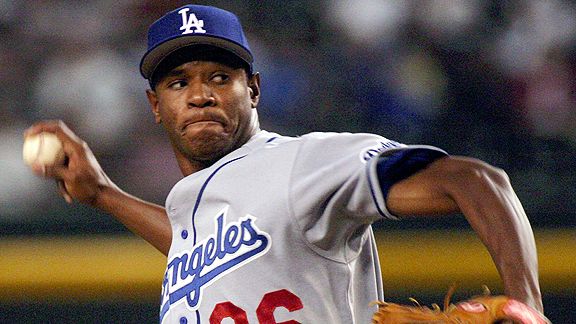
Roy Dabner/AP
Has it really been almost seven years since Edwin Jackson’s thrilling debut against Arizona?
While the Dodgers were getting worked over by the press for not adding a premium starting pitcher during the 2009-10 offseason, the Arizona Diamondbacks were boldly going out to get 2009 American League All-Star Edwin Jackson (who starts tonight against the Los Angeles) for their rotation — trading, among others, one-time prized prospect Max Scherzer. Here’s what I wrote at the time:
My early reaction to the news that the Arizona Diamondbacks had traded away Max Scherzer was, “The Dodgers have the McCourts. What’s Arizona’s excuse?”
From what I could tell, almost all the thoughts about Tuesday’s trade, a three-way endeavor that included Arizona sending Scherzer and Daniel Schlereth to Detroit in exchange for the Tigers’ Edwin Jackson and the Yankees’ Ian Kennedy, matched mine. Why was Arizona giving up a lower-paid pitcher with a higher ceiling?
I know I’m not alone among Dodger fans in retaining a soft spot for former boy in blue Jackson, who had his best season last year and is still only 26. But I’ve been hearing for quite some time splendiferous things about Scherzer, who is 25, struck out more than a batter an inning in 2009 with an adjusted ERA of 111 (4.12 ERA) and will make millions less than Jackson in 2010.
If the Dodgers had made this kind of trade — a prized young pitcher sent away for short-term gain — anger would have blasted through the roof and finger-pointing would have zoomed through the hole in the roof that anger had created. It would have been an ugly day, at least on this website. Even though the Dodgers would be taking on more salary for 2010, the trade would have been seen as a short-sighted mortgaging of the future, another sign of a crumbling empire. (A similar scenario: Imagine the Edwin Jackson for Lance Carter-Danys Baez trade happening now.)
Yes, some would have defended the trade, just as some are pointing out that Scherzer might not have the build or mechanics to truly blossom as a starter, or that Kennedy still has rotation potential, or that Jackson should do even better in migrating back to the National League. But considering how negative the overall reaction is toward Arizona making this move, you can only imagine, in the context of the Dodgers’ current dysfunction, how harsh things would have been if Los Angeles had done it. …
So how has it all worked out? As you might expect, not as expected.
Scherzer has a 6.81 ERA in seven starts for Detroit — and that’s lower than Jackson’s 7.32 mark for Arizona. However, Kennedy, the lesser of the starting pitchers to come in the trade, has a 3.48 ERA despite allowing a National League-high eight home runs. (Among others involved in the trade, Phil Coke and Austin Jackson have also done well for Detroit, while Schlereth is in the minors. Curtis Granderson is mired in a lousy year, making the Yankees the big loser in the deal to date.)
In September 2003, Jackson made his major-league debut on his 20th birthday against Randy Johnson and won, on a night dimensionally more thrilling than John Ely’s besting of Dan Haren Tuesday. Tonight on the same field, he’ll be trying again to recapture those good vibes, while the Dodgers, who were held to two runs over six innings the only other time they have faced him (while he had a 7.85 ERA with Tampa Bay at the time), will try again to avoid looking bad for ever letting Jackson go in the first place.
* * *
Two notes from Stat of the Day: 2009 Dodger Will Ohman, who spent most of the year on the disabled list, has a 0.00 ERA after 11 innings with Baltimore (allowing four of 13 inherited runners to score), and No. 8 hitters for the Giants have an Andre Ethier-like 1.194 OPS this season, led by Nate Schierholtz.
* * *
Joined by my colleague Stuart Levine, I’m doing another live chat about all things TV today for Variety at 2:30 p.m. As of this moment, you can click the link and start sending your questions …
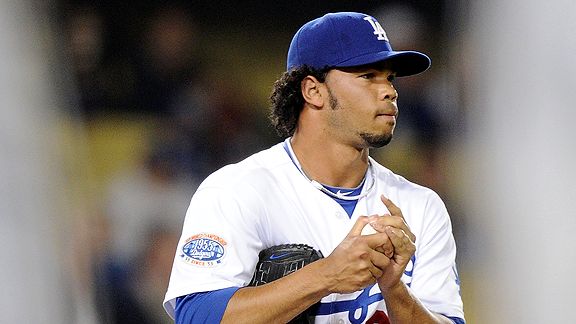
Getty Images
Stat o’ the Day: Just 27 games into the Dodgers’ 2010 season, Ramon Troncoso has already pitched in 11 losses.
It may be early, but the fans are going wild – and not in a good way.
Wednesday’s 11-3 loss to Milwaukee marked the one-month anniversary of a Dodger season that began with an 11-5 loss to Pittsburgh. Two days shy of one year since Manny Ramirez’s suspension, it’s remarkable to think back and realize: The Dodger community was probably in better spirits that sorry day than now.
The wreckage of the Dodgers’ start to 2010 fits perfectly with the narrative that began in the offseason, which foretold that the divorce of Frank and Jamie McCourt would have a domino effect that would leave the franchise in ruins. And while this isn’t exactly Carthage, it is last place in the National League West in May.
A different ownership situation might have bred a different start to the season, it’s true. No, a pair of happily married McCourts would not have turned the 2009-10 Dodger offseason into a wheeling-and-dealing free-for-all – not after reaching the National League Championship Series two straight years, certainly not after the Jason Schmidt and Andruw Jones debacles of recent offseasons. But Frank and Jamie surely wouldn’t have made fewer moves if they were still going steady.
But what’s sad about the 2010 Dodgers is that the doleful divorce has been only one of many, many, many other things that have gone wrong this season. Here begins “Lament: Why Even in Their Worst Nightmares, the Dodgers Couldn’t Fathom Being This Bad.”
Chapter the First: A Rotation Off Its Axis
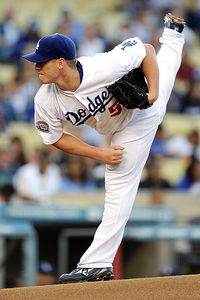
Mixed bag: The last 23 batters Chad Billingsley faced Wednesday did not score; the first four did.
Consider, if you will, that the Dodger starting rotation at the end of the 2009 season was made up of Randy Wolf (having something of a career year), a wounded Hiroki Kuroda, a staggering Chad Billingsley, a green Clayton Kershaw, and Vicente Padilla having, well, two great weeks.
Though spring training 2010 began with Wolf in a Milwaukee Brewers uniform, there was every reason to believe that at least 60 percent of that bunch would be better than they were – in contrast to Wolf, who you’d reasonably expect to decline after everything imaginable went right for him at age 33. And in fact, that’s exactly what happened with Kuroda, who has a 2.08 ERA while averaging 6.9 innings per start this year.
But though they have had their moments, Billingsley and Kershaw haven’t exactly been the equivalent of, say, Colorado’s Ubaldo Jimenez, who has pitched 41 1/3 innings with a 0.87 ERA and 44 strikeouts. The growing pains are still evident – more painfully in the case of Billingsley, who is only six months younger than the cherry-picked Jimenez, but more fable-busting for Kershaw, who was supposed to be the guy with the head on his shoulders but instead has walked a mind-boggling seven batters per nine innings in ’09. Both still have bright futures, but the need for more consistency remains. (Tony Jackson of ESPNLosAngeles has more on Billingsley.)
Then there was Padilla, who had two fine starts in the postseason but otherwise had been a forgettable pitcher for most of the past five years or more. The Dodgers chose him in January over Jon Garland, a pitcher they thought enough of five months earlier that they traded infield prospect Tony Abreu for him. The 30-year-old Garland, who signed with San Diego for a guaranteed $5.9 million (including a potential 2011 $600,000 club buyout), has an ERA of 2.06 (adjusted ERA 184) over 35 innings in six starts. The 32-year-old Padilla, who signed with the Dodgers for a guaranteed $5.025 million plus incentives, has pulled a mini-Schmidt: 21 2/3 innings, 6.65 ERA (61 ERA+) and an indefinite stay on the disabled list. This wasn’t the divorce or the budget talking. The Dodgers made a pretty simple either-or choice, and at least to this point, they chose wrong. (And did so even with the character issues that are supposedly so important to Dodger general manager Ned Colletti being in Garland’s favor.)
The fifth spot in the Dodger starting rotation had a number of candidates, though ideally there should only have been two: James McDonald and Scott Elbert. McDonald was the 2008 and 2009 Dodger Minor League Pitcher of the Year who had a rough start in 2010 before finishing the year strong. Elbert is considered by many to be an even brighter prospect. However, neither came close to making any kind of case in spring training that they belonged in the rotation – though they were given little opportunity while manager Joe Torre quickly turned his focus to pitchers who had no more minor-league options, like perennial also-ran Eric Stults and knuckleballer Charlie Haeger, along with a cascade of scrapheap veterans like the Ortiz Unbrothers, Ramon and Russ. Honestly, it was reasonable to suspect that someone from McDonald, Elbert and frenemies could give the Dodgers inconsistent but useful enough output in the back of the rotation – and the Dodgers have certainly had their share of luck in this area in recent years – but it hasn’t come close to happening. That in turn made the Dodgers particularly ill-prepared, at least at this point, for an injury to one of their front four starters, even Padilla.
This brings us back to the four pitchers most talked about this Dodger offseason. One was Wolf, who had a 4.91 ERA after three starts this season but has since allowed two runs in his past 14 innings. Two was John Lackey, who signed a five-year, $82 million contract with the Red Sox and has a 3.89 ERA. Lackey figured to be a B version of the former Dodger with the famous seven-year contract itch, Kevin Brown – not quite as expensive but not quite as good and arguably every bit as likely to get injured for part of his contract. Lackey raises a good question: Do you pay big money for a pitcher even knowing that one of those years he’s likely to spend on the DL? I would have said no – and perhaps that’s ultimately a question for the accountants – but given the Dodgers’ current pitching desperation, many people would probably be inclined to say yes.
Pitchers three and four are Cliff Lee and Roy Halladay, the most-discussed trade targets of the past year. Whatever efforts the Dodgers made to acquire them, the organization has ultimately had to bet that what they had in Kershaw and Billingsley (among other young players) in the long term would be worth more than what they would get out of Lee and Halladay in the short term – not a bad bet, but strictly as of May 2010, a losing bet.
So there you have it. We’ve discussed close to a dozen starting pitchers, and of that group, only Kuroda has given the Dodgers a happy beginning to 2010. Some of the misfortune the Dodgers brought upon themselves; some of it has been ill-fated – but when you add it all up, it’s almost a clean sweep for Murphy’s Law over Los Angeles.
Chapter the Second: The Blahpen
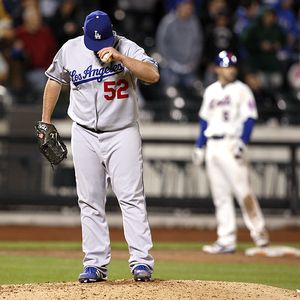
George Sherrill: 0.65 ERA as a Dodger in 2009, 9.00 in 2010.
When your best reliever (Jonathan Broxton) hasn’t even pitched nine innings all year, when your next-best bullpen success story is a Rule 5 draftee (Carlos Monasterios) who remains on the roster, things have gone horribly wrong.
Maybe it all started with Ronald Belisario, for virtually all of spring training trapped in a distant land like a passenger crashing with Oceanic 815, his absence shifting the balance of the bullpen when the season began ever-so-slightly yet ever-so-significantly. His MIA act, accompanied by another ill-timed injury to lefty mesmerizer Hong-Chih Kuo and an almost complete reversal-of-fortune by 2009’s stellar set-up man, George Sherrill, turned a key Dodger strength into a disaster area. In the Dodgers’ first 15 games of 2010, the bullpen lost five – that alone made a huge difference between the Dodgers being 11-16 this morning as opposed to 16-11, of being 5 1/2 games out of first place as opposed to just half a game. And that doesn’t even count games like Wednesday’s, in which the bullpen was handed a one-run deficit and let it multiply by 800%.
What did the Dodgers do wrong with their relievers? Not a lot. Yeah, if money were no object, they could have outbid the Angels for a guy like Fernando Rodney, who signed for an exorbitant amount of money for a reliever: two years, $11 million. Or they could have spent $50,000 on a chaperone for Belisario. Beyond that, what they assembled was battle-tested and looked like one of the best bullpens in baseball. It just hasn’t worked out that way.
Chapter the Third: Defenestrate the defense
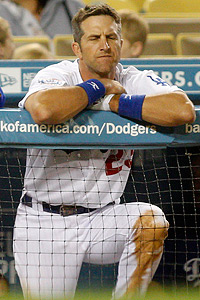
Charged with 10 errors last year, Casey Blake has made half that many this year.
Wednesday, Major League Baseball announced that a change by the official scorer gave James Loney a throwing error for a play that occurred against the Reds nearly two weeks before. It kind of fit: The Dodger defense has been so poor this year that it can pick up errors without even playing.
The defense had actually been on a modest streak of errorless games recently until Wednesday night against the Brewers, when Casey Blake threw in the dirt in the seventh inning of what at the time was a one-run game. Before the night was over, the team botched a rundown play and Blake made another error, his fifth in 24 games.
It felt very familiar. For most of the year, the defense has been toxic. The expected weak spots, such as Ramirez in left field, haven’t even been the story. There have been mistakes all over the field, to the extent that Matt Kemp’s 2009 Gold Glove in center field is being examined for “Dewey Defeats Truman” inaccuracies.
The defense broke the levee on the already cracking Dodger pitching, helping spoil what really was a true onslaught by the Dodger offense in the opening days of the year. The Dodgers averaged 6.5 runs in those first 15 games, but lost eight of them. And yet at seven of eight positions, this was the same defense that the Dodgers took to the NL playoffs last year. The mere aging of players Blake and Ramirez doesn’t begin to explain it. Did the Dodgers not prepare properly in spring training? Who knows? But this was another walk off the cliff that at least in part appeared out of nowhere.
Chapter the Fourth: Yes, Everyone Gets Injuries …
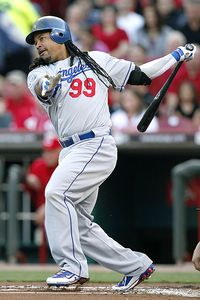
Manny Ramirez has a 1.159 OPS – but only 52 plate appearances.
… so we won’t cry too long over the Dodgers’ sick bay. Losing Kuo was one thing, losing Jeff Weaver was barely anything, but losing Padilla was a problematic thing, and then Ramirez and Rafael Furcal going out almost simultaneously was a big thing. No one expected either Ramirez or Furcal to play 162 games, but in a better Dodger world, they would have at least made it through April. Heck, Ramirez made it into May last year before he was unceremoniously sidelined by what turned up in the lab.
In any case, it’s fair to say that the Dodgers knew in advance they would need a bench this year – and it’s no secret that Colletti has always liked to have depth. But again, some choices that had nothing to do with the divorce have gone awry. For example, on December 16, Jamey Carroll (36 in February) signed with the Dodgers for nearly $4 million over two years. Two weeks later, Kelly Johnson (28 in February) signed a cheaper contract in overall value with Arizona: one year, $2.35 million. Carroll has a .383 on-base percentage but just one extra-base hit. Johnson was just named NL Player of the Month after going 25 for 80 with eight doubles and nine home runs – a .404 on-base percentage and .750 slugging percentage.
Brad Ausmus and Garret Anderson have been wasted signings, albeit relatively inexpensive ones. You’re never going to get ’em all right, and you can certainly argue that so far, Ronnie Belliard has been worth the $825,000 he lost weight to earn from the Dodgers, while Reed Johnson has been what you’d expect him to be. But those are the few breaks the Dodgers have caught, in a first month that exposed another nagging worry sooner than they would have hoped.
Chapter the Fifth: Five months to go
Wednesday, Billingsley gave up four runs in the first inning – then pitched five shutout innings and could have come out battling for a win in the seventh inning had Carroll, well, been able to hit his first three-run homer in 2,574 career plate appearances. Yep, this is when you bring out the unseemly disclaimer: It’s still early.
I haven’t even wanted to mention that the 2009 Colorado Rockies started with an 11-16 record at this time last year, exactly where the Dodgers are today – and then lost 12 of their next 19 before bouncing back with a months-long hot streak that scared the pajamas off every NL rival going into the playoffs. When John Ely, who was something like the Dodgers’ No. 14 starter entering spring training, is the guy you’re counting on for the second week in a row to prevent a series sweep, it’s not auspicious. If Kuroda goes down at some point this year, the Dodgers could give their 91-loss 2005 a run for its worthless money. But yes, it’s still early.
Maybe with happier owners, the Dodgers sign Wolf. Mainly with different owners, the Dodgers splurge for Lackey. Maybe there’s a parallel universe where the Dodgers make the big trade for Lee or convince Halladay that the West Coast ain’t so bad. But the Dodger problems in 2010 have been much more than the loss of one veteran pitcher.
And that’s with some things that people expected to go wrong not doing so at all. Kuroda wasn’t done as a pitcher. Ramirez wasn’t done as a hitter. Broxton has not been scarred by Jimmy Rollins’ game-winning double in the 2009 NLCS. Andre Ethier hasn’t regressed – he’s an early contender for the Triple Crown. James Loney is showing signs of life.
For that matter, Juan Pierre, the supposedly reborn savior from 2009 who was sent to the White Sox for 2010, is batting .226, with seven walks and 15 steals in 19 attempts but no extra-base hits.
It’s still early – but whether it’s early enough for a turnaround or just early in a miserable year, I don’t know. Even for a team playing ball both on the field and in divorce court, so much can change between May and October. After all, look at what’s happened to the Dodgers between October and May.
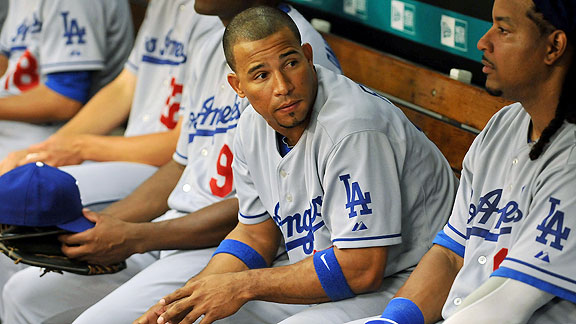
Steve Mitchell/US Presswire
Rafael Furcal
The Dodgers officially placed Rafael Furcal on the disabled list and chose to call up Nick Green instead of Chin-Lung Hu to take his place on the roster, according to their daily press notes. Furcal will be eligible to come off the DL on May 13. Cory Wade was moved to the 60-day disabled list to make room for Green on the 40-man roster.
Mike Scioscia’s Tragic Illness argues why Hu should have gotten the call.
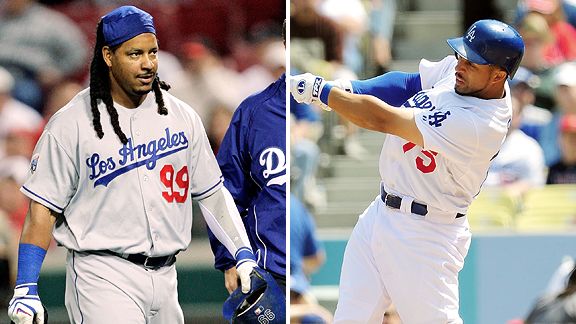
AP/US Presswire
At 1 p.m., the Dodgers announced that Manny Ramirez would be placed on the disabled list with a right calf strain and that Xavier Paul would be recalled to join the active roster.
Paul has a .409 on-base percentage and .574 slugging percentage in 66 plate appearances for Albuquerque this season.
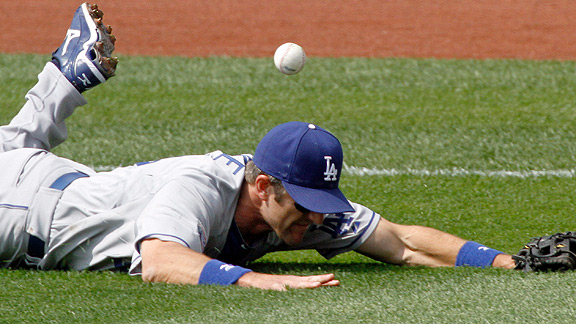
Keith Srakocic/AP
Casey Blake has three errors in 11 starts, though none of his errors have affected the game’s outcome.
Here’s a quick rundown of the Dodger errors and their effects this season. In 14 games, the team has made 16 errors, leading to 12 unearned runs. Three of the errors have contributed directly to losses.
1) Russell Martin (1), April 5 at Pittsburgh (Game 1, second inning)
Error: Tied 2-2, with runners on first and second, Martin bobbled Zach Duke bunt in front of home plate.
Consequences: No runs, seven extra pitches thrown by Vicente Padilla.
2) Casey Blake (1), April 5 at Pittsburgh (Game 1, seventh inning)
Error: Down 8-5, with bases empty and one out, Blake flubbed Jeff Clement’s grounder.
Consequences: No runs, three extra pitches thrown by Russ Ortiz.
3) Blake DeWitt (1), April 7 at Pittsburgh (Game 2, 10th inning)
Error: Tied 3-3, first batter of the inning, DeWitt commits miscue on Lastings Milledge grounder.
Consequences: Milledge sacrificed to second and two batters later scores winning (unearned) run off Ramon Ortiz.
4) Ronnie Belliard (1), April 8 at Pittsburgh (Game 3, seventh inning)
Error: Leading 8-1, one out and bases empty, third baseman Belliard allows Andrew McCutchen to reach on a grounder.
Consequences: Ramon Troncoso induces 4-6-3 double play from next batter.
5) Ronnie Belliard (2), April 8 at Pittsburgh (Game 3, eighth inning)
Error: Leading 8-2, one out and runner on second, Adam LaRoche takes advantage of another Belliard mistake.
Consequences: Carlos Monasterios retires next two batters, two extra pitches required.
6) Casey Blake (2), April 9 at Florida (Game 4, fifth inning)
Error: Tied 0-0, leadoff batter Cody Ross reaches on Blake mistake.
Consequences: Hiroki Kuroda retires next three batters, one extra pitch required.
7) Russell Martin (2), April 9 at Florida (Game 4, sixth inning)
Error: Tied 0-0, Martin throws away Cameron Maybin bunt (single plus error).
Consequences: Kuroda allows one-out single to Jorge Cantu for unearned run. Needs three extra pitches to get out of inning.
8) Matt Kemp (1), April 11 at Florida (Game 6, sixth inning)
Error: Leading 5-3 with bases empty and two out, Kemp misreads shallow Ronny Paulino fly ball, dives for it but bobbles it for two-base error.
Consequences: Charlie Haeger allows RBI single for unearned run, then a walk before getting a groundout to end inning. Nine extra pitches. Dodgers ultimately lose, 6-5.
9) Rafael Furcal (1), April 15 vs. Arizona (Game 9, second inning)
Error: Trailing 1-0 with runner on second and and two out, Furcal throws away Conor Jackson’s infield single.
Consequences: Jon Hester comes around to score unearned run; Tony Abreu extends Kuroda for eight pitches before grounding out to end inning.
10) Casey Blake (3), April 15 vs. Arizona (Game 9, ninth inning)
Error: Arizona leads 4-3 with runners on first and third and one out when Blake mishandles Abreu grounder.
Consequences: Unearned run scores. Dodger reliever Ramon Ortiz called in, needs four extra pitches to get out of inning. Dodgers tie game in bottom of the ninth thanks in great part to a Stephen Drew error, then win in 10th.
11) A.J. Ellis (1), April 17 vs. San Francisco (Game 11, third inning)
Error: Trailing 1-0, runner on first, Ellis throws ball away on Aubrey Huff steal attempt.
Consequences: See next entry.
12) Jamey Carroll (1), April 17 vs. San Francisco (Game 11, third inning)
Error: With Huff on third, Carroll (playing shortstop) can’t handle Mark DeRosa grounder.
Consequences: Four runs score in the inning — two unearned, thanks to the errors and an Ellis passed ball.
13) Chad Billingsley (1), April 20 at Cincinnati (Game 13, second inning)
Error: Tied 3-3 with no outs and runners on first and third, Billingsley throws away Homer Bailey’s sacrifice attempt.
Consequences: Most disastrous defensive play of year to date. Of six runs Billingsley allows in inning, three are unearned. Billingsley needs nine extra pitches to exit inning. Dodgers lose, 11-9.
14) Russell Martin (3), April 20 at Cincinnati (Game 13, fourth inning)
Error: Trailing 7-3, runner on first and two out, Martin throw gets away on Drew Stubbs steal attempt.
Consequences: The next batter, Joey Votto, homers off Ramon Ortiz. Runs are earned. Ortiz needs three extra pitches to end the inning.
15) Blake DeWitt (2), April 21 at Cincinnati (Game 14, fourth inning)
Error: Leading 4-3, runner on first and one out, DeWitt lets potential double-play grounder get past him.
Consequences: One out and one Kuroda walk later, Aaron Harang knocks his controversial single just shy of Andre Ethier’s glove for unearned run.
16) Rafael Furcal (2), April 21 at Cincinnati (Game 14, fourth inning)
Error: Leading 9-4, runner on first and two out, an easy grounder to Furcal somehow gets through.
Consequences: George Sherrill replaces Kuroda and gives up a single that scores two unearned runs. Sherrill uses three more pitches to end inning. Error forced the Dodgers to use an extra pitcher in the game.
* * *
Update: The Dodgers have activated Hong-Chih Kuo and placed Jeff Weaver on the disabled list.
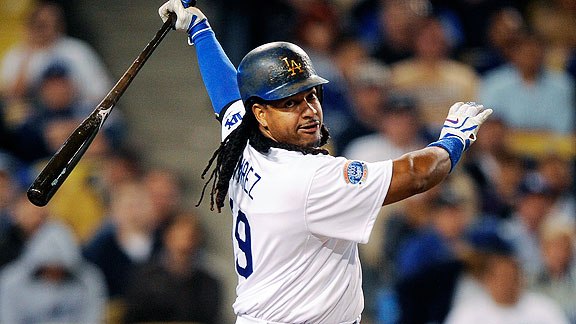
Mark J. Terrill/AP
Manny’s calf is still mooing.
Russ Ortiz has been designated for assignment by the Dodgers, who have called up righty Jon Link to replace him for the time being. Link has been hit pretty hard at Albuquerque this season – 10 baserunners against 13 outs – so at this point he might just be a different sort of mop-up man until Hong-Chih Kuo is activated.
- Today marks the 60th anniverary of Vin Scully’s Dodger debut.
- Saturday’s 20-inning Mets-Cardinals game was scoreless for the first 18 innings, the longest a game had been scoreless since Rick Dempsey’s 22nd-inning home run gave the Dodgers a 1-0 victory over Montreal in 1989.
- Josh Towers pitched six innings of one-run, seven-baserunner ball for Albuquerque on Saturday, but the Isotopes suffered a 2-0 defeat.
- Jerry Sands had two doubles and a triple in Great Lakes’ 4-2 loss Saturday. The 22-year-old is on-basing .465 and slugging .763 in 10 games this season, with seven extra-base hits in that time.
- Babe Ruth was in a near-fatal car accident in 1938, when he was a Brooklyn Dodgers coach. Blue Heaven passes along photos of Ruth and a description of the wreck.
- Video of Lefty Grove has been posted at Minor League Ball. Grove was held captive in the minors well past the point that he was major-league ready.
- Nice recap of Ubaldo Jimenez’s no-hitter for Colorado – the first in Rockies history – from Troy E. Renck of the Denver Post.
- According to the Dodger press notes, DodgerTalk with Ken Levine and Josh Suchon on KABC AM 710 will be soliciting callers for their best nicknames for Andre Ethier and Matt Kemp. Somebody better stick up for the Bison.



